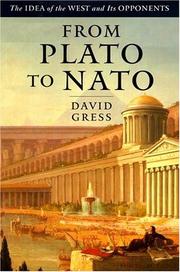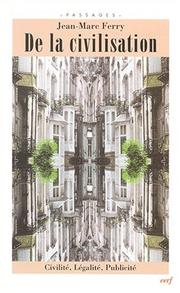| Listing 1 - 10 of 29 | << page >> |
Sort by
|
Book
Year: 1998 Publisher: New York Free Press
Abstract | Keywords | Export | Availability | Bookmark
 Loading...
Loading...Choose an application
- Reference Manager
- EndNote
- RefWorks (Direct export to RefWorks)
Book
ISBN: 9780810141483 9780810141490 0810141485 0810141493 Year: 2020 Publisher: Evanston (Ill.): Northwestern university press,
Abstract | Keywords | Export | Availability | Bookmark
 Loading...
Loading...Choose an application
- Reference Manager
- EndNote
- RefWorks (Direct export to RefWorks)
Husserl and the Idea of Europe argues that Edmund Husserl’s late reflections on Europe should not be read either as departures from his early transcendental phenomenology or as simple exercises of cultural criticism but rather as systematic phenomenological reflections on generativity and historicity. Timo Miettinen shows that Husserl’s reflections on Europe contain his most compelling and radical interpretation on the intersubjective, communal, and historical dimensions of phenomenology. Husserl and his generation worked in the aftermath of World War I, as Europe struggled to redefine itself, and he penned his late writings as the clouds of World War II gathered. Decades later, the fall of the Soviet Union again altered the continent’s identity and its political and economic divisions. Miettinen writes as a European involved in the question of Europe, and many of the recent authors and critics he addresses in this work—such as Michel Foucault, Jacques Derrida, and Giorgio Agamben—likewise deeply engaged with this new problem of European identity. Husserl and the Idea of Europe interprets key concepts of Husserl’s late philosophy in new, compelling ways. The book illuminates the multifaceted problem of the idea of European rationality, and it defends novel conceptions of universalism and teleology as necessary components of radical philosophical reflection.
Phenomenology --- Political science --- Philosophy --- Husserl, Edmund, --- Europe --- Political science - Europe - Philosophy --- Husserl, Edmund, - 1859-1938 --- Europe - Philosophy

ISBN: 0743264886 Year: 1998 Publisher: New York : Free Press,
Abstract | Keywords | Export | Availability | Bookmark
 Loading...
Loading...Choose an application
- Reference Manager
- EndNote
- RefWorks (Direct export to RefWorks)
Book
Year: 2011 Publisher: Lanham : Scarecrow Press,
Abstract | Keywords | Export | Availability | Bookmark
 Loading...
Loading...Choose an application
- Reference Manager
- EndNote
- RefWorks (Direct export to RefWorks)
In What Makes Music European, Marcello Sorce Keller addresses the little-discussed matters that are essential to an understanding of how music intersects with the life of so many people. Readers are offered an approach for thinking about music that depends as much on its history as on the concepts and attitudes of the social sciences. What Makes Music European concisely demonstrates, to those familiar with Western music, how peculiar Euro-Western concepts of music app
Music - Europe - History and criticism. --- Music -- Europe -- History and criticism. --- Music - Europe - Philosophy and aesthetics. --- Music -- Europe -- Philosophy and aesthetics. --- Music - Political aspects - Europe. --- Music -- Political aspects -- Europe. --- Music - Social aspects - Europe. --- Music -- Social aspects -- Europe.
Book
ISBN: 2852760460 9782852760462 Year: 1990 Volume: 6 Publisher: Bordeaux: Bière,
Abstract | Keywords | Export | Availability | Bookmark
 Loading...
Loading...Choose an application
- Reference Manager
- EndNote
- RefWorks (Direct export to RefWorks)
Law --- Justice (Philosophy) --- Philosophy. --- -Justice (Philosophy) --- -Acts, Legislative --- Enactments, Legislative --- Laws (Statutes) --- Legislative acts --- Legislative enactments --- Jurisprudence --- Legislation --- Philosophy --- Philsosphy --- -Philosophy --- -Philsosphy --- Law - Philosophy --- Law - Europe - Philosophy.

ISSN: 02989972 ISBN: 2204066494 9782204066495 Year: 2001 Publisher: Paris: Cerf,
Abstract | Keywords | Export | Availability | Bookmark
 Loading...
Loading...Choose an application
- Reference Manager
- EndNote
- RefWorks (Direct export to RefWorks)
Civil society --- Law --- Philosophy. --- Philosophy --- -Law (Philosophy) --- Law (Philosophy) --- Social contract --- Europe --- -Council of Europe countries --- Eastern Hemisphere --- Eurasia --- Civilization --- -Civilization --- Civilization. --- Civil society - Europe - Philosophy. --- Law - Philosophy
Book
ISBN: 342810885X 9783428108855 Year: 2003 Volume: 101 Publisher: Berlin: Duncker und Humblot,
Abstract | Keywords | Export | Availability | Bookmark
 Loading...
Loading...Choose an application
- Reference Manager
- EndNote
- RefWorks (Direct export to RefWorks)
Law --- Philosophy --- History. --- Acts, Legislative --- Enactments, Legislative --- Laws (Statutes) --- Legislative acts --- Legislative enactments --- Philosophy&delete& --- History --- Jurisprudence --- Legislation --- Law - Europe - Philosophy - History.
Book
ISBN: 2707128104 9782707128102 Year: 1997 Volume: 233 Publisher: Paris: La Découverte,
Abstract | Keywords | Export | Availability | Bookmark
 Loading...
Loading...Choose an application
- Reference Manager
- EndNote
- RefWorks (Direct export to RefWorks)
Sociology --- Sociologie --- History --- Histoire --- Elias, Norbert, --- Sociologues --- Sociologists --- Philosophy --- Sociologists - Germany - Biography --- Sociology - Europe - Philosophy --- Elias, Norbert, - 1897-1990 --- ELIAS (NORBERT), 1897-1990 --- SOCIOLOGIE --- HISTORIOGRAPHIE --- CRITIQUE ET INTERPRETATION --- 20E SIECLE --- METHODOLOGIE --- HISTOIRE
Book
ISSN: 21035636 ISBN: 9782406120704 9782406120711 2406120708 2406120716 Year: 2021 Volume: 525 8 Publisher: Paris: Classiques Garnier,
Abstract | Keywords | Export | Availability | Bookmark
 Loading...
Loading...Choose an application
- Reference Manager
- EndNote
- RefWorks (Direct export to RefWorks)
Méconnu en France, le krausisme, inspiré par le philosophe du droit Karl Krause et nourri par ses disciples (Ahrens, Röder...), fut un courant de pensée majeur aux XIXe et XXe siècles. Sa réception en Europe, France comprise, n'était guère étudiée, en dehors de l'Espagne où son importance semble encore actuelle. Le présent livre aborde les versants juridique et politique du krausisme, sous tous leurs angles. D'un côté, les droits naturel, politique, pénal, social et corporatif, tirant ici profit de la thèse associationniste de « l'idéal de l'Humanité » censée résoudre la question sociale. De l'autre, l'éducation, le féminisme (dont il fut un précurseur), le libéralisme solidaire et la démocratie organique, le tout sur fond de régulation du social.
Law --- Natural law --- Panentheism --- Philosophy --- Law and legislation --- Panenthéisme --- Droit --- Philosophie --- Philosophie politique --- Panenthéisme --- Law - Philosophy - Congresses. --- Natural law - Congresses. --- Panentheism - Law and legislation - Europe - Congresses. --- Panentheism - Europe - Philosophy - Congresses. --- Krause, Karl Christian Friedrich, - 1781-1832
Book
ISBN: 9780754668541 9780754695011 0754695018 0754668541 9781315608006 9781317058311 9781317058328 Year: 2011 Volume: *7 Publisher: Farnham ; Burlington, VT Ashgate
Abstract | Keywords | Export | Availability | Bookmark
 Loading...
Loading...Choose an application
- Reference Manager
- EndNote
- RefWorks (Direct export to RefWorks)
Secrets played a central role in transformations in medical and scientific knowledge in early modern Europe. As a new fascination with novelty began to take hold from the late fifteenth century, Europeans thirsted for previously unknown details about the natural world: new plants, animals, and other objects from nature, new recipes for medical and alchemical procedures, new knowledge about the human body, and new facts about the way nature worked. These 'secrets' became popular items of commerce and trade, as the quest for new and exclusive bits of information met the vibrant early modern marketplace. Whether disclosed widely in print or kept more circumspect in manuscripts, secrets helped drive an expanding interest in acquiring knowledge throughout early modern Europe. Bringing together international scholars, this volume provides a pan-European and interdisciplinary overview on the topic. Each essay offers significant new interpretations of the role played by secrets in their area of specialization. Chapters address key themes in early modern history and the history of medicine, science and technology including: the possession, circulation and exchange of secret knowledge across Europe; alchemical secrets and laboratory processes; patronage and the upper-class market for secrets; medical secrets and the emerging market for proprietary medicines; secrets and cosmetics; secrets and the body and finally gender and secrets. -- Publisher
Book history --- History of human medicine --- anno 1500-1799 --- Medicine -- Europe -- Philosophy -- History. --- Medicine, Magic, mystic, and spagiric -- Europe -- History. --- Science -- Europe -- Philosophy -- History. --- Secret (Philosophy). --- Medicine --- Science --- Medicine, Magic, mystic, and spagiric --- Secret (Philosophy) --- Natural Science Disciplines --- Humanities --- Disciplines and Occupations --- History, Modern 1601 --- -History --- History, Early Modern 1451-1600 --- History of Medicine --- Health & Biological Sciences --- History --- Philosophy --- -Science --- History. --- history --- -Medicine --- knowledge --- alchemy --- medicine [discipline] --- Médecine --- Médecine et ésotérisme --- Sciences --- Philosophie --- Histoire. --- Pratiques magiques --- geschiedenis van de wetenschappen --- Médecine
| Listing 1 - 10 of 29 | << page >> |
Sort by
|

 Search
Search Feedback
Feedback About UniCat
About UniCat  Help
Help News
News